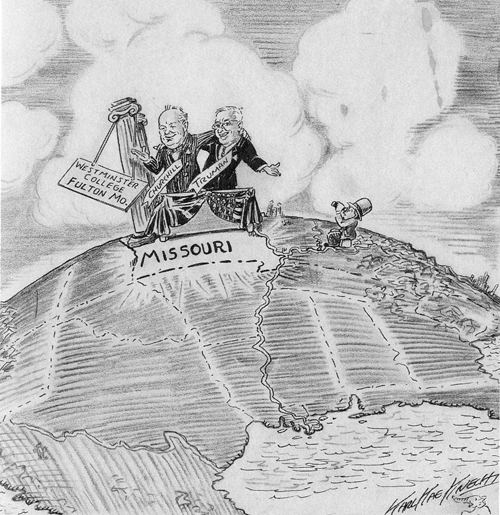On March 5, 1946, Winston Churchill delivered one of the most significant speeches of the 20th century on the campus of Westminster College in Fulton, Missouri. The famous “Sinews of Peace” speech, with its reference to Europe’s “iron curtain,” is still remembered 65 years later. But the trip proved costly for the former British prime minister – on the eve of his speech, Churchill nearly lost his shirt to President Harry S. Truman in a poker game.
In Cowboys Full: The Story of Poker, James McManus provides a brief sketch of Churchill’s unlucky night spent aboard the late FDR’s presidential armored train car, the Ferdinand Magellan. A well-known poker player, Truman took his motto, “The Buck Stops Here,” from card-game parlance. McManus writes:
Churchill had downed five scotches before the action began, and now he pretended that he hadn't the foggiest idea how to play. That night Churchill lost steadily—so much, in fact, that when the great Brit left the table for a moment, Truman told his companions to let up a bit. "But, Boss, this guy's a pigeon," said General Vaughan. "If you want us to play our best poker for the nation's honor, we'll have this guy's pants before the evening is over."
Churchill was down $250 when he quit at 2:30 in the morning – no paltry sum in 1940s dollars. He could have earned it back with interest had he charged admission for his speech the next day in Fulton.
The town’s population temporarily ballooned from 6,500 to 30,000 as the national media, VIPs and their entourages, and rubberneckers from all over filled the streets to catch a glimpse of Truman and Churchill together. Though Churchill’s party had lost the 1945 general election, and he was booted from Prime Minister to Leader of the Opposition, he maintained his reputation in the six years he was out of office (he became Prime Minister again in 1951) by publishing books and speaking prolifically. And people listened.
As Kansas City Public Library Director Crosby Kemper III writes in the introduction to Winston Churchill: Resolution, Defiance, Magnanimity, Good Will, Churchill’s arrival effectively put Fulton on the map.
Before [Churchill’s visit] probably the most reverberating event on the banks of Stinson Creek in central Missouri had been the publication of Kings Row, a kind of prewar Peyton Place, whose fame as a small-town soap opera was enhanced by the film version starring Ronald Reagan in his best and most melodramatic role.
Newspaper editorial cartoonists, too, noted the national attention that was suddenly thrust upon little Fulton, viz. this charming caricature from the Evansville (Ind.) Courier.

Cartoon reprinted in Churchill’s “Iron Curtain” Speech Fifty Years Later (Muller, ed.)
But in spite of all the hype, the message in Churchill’s “Sinews of Peace” speech was dead serious.
Addressing a gymnasium packed with 3,000 people and with President Truman at his side, Churchill uttered the famous warning: “From Stettin in the Baltic to Trieste in the Adriatic, an iron curtain has descended across the Continent.”
Churchill believed that Eastern and Central Europe were subject to increasing Soviet control and influence and that it constituted a serious challenge to any hope of a peaceful world. He called for the western democracies to stand together under the United Nations Charter and show strength and unity in the face of this “growing challenge and peril to Christian civilization.”
Listen to audio and read text of the entire speech, courtesy of the Churchill Centre (London).
“The Sinews of Peace” touched nerves on both sides of the curtain. The U.S. and British governments distanced themselves – publicly, at least – from Churchill’s unfavorable view of the Soviets. Lord Halifax urged Churchill to make amends with their former ally, Russian leader Joseph Stalin, who denounced the speech as war mongering. (Truman invited Stalin to give a public response in Columbia, Missouri, but, alas, “Uncle Joe” declined.)
But just as he predicted the rise of Hitler years before the world would see the true danger of Nazi Germany, Churchill’s warnings about Soviet totalitarianism also came to pass. And for the better part of the next half-century, Allies were turned to enemies in the nuclear-tinged tide of the Cold War.
This weekend marks the 65th anniversary of Churchill’s speech at Fulton, and the Winston Churchill Memorial and Library at Westminster College is celebrating with a series of events and lectures on March 5 and 6, 2011. Featured speakers include British Ambassador to the U.S. Sir Nigel Sheinwald and World War II scholar Sir Max Hastings, who will also be giving a free presentation at the Central Library on Monday, March 7. St. Louis-based artist Don Wiegand will unveil a specially commissioned Iron Curtain sculpture.
The Kansas City Public Library will commemorate the anniversary with a special display. Drop by the third floor of the Central Library to check out some of our many books about and by Churchill, including the following:
- Churchill’s “Iron Curtain” Speech Fifty Years Later by James W. Muller, ed.
- Winston Churchill: Resolution, Defiance, Magnanimity, Good Will by R. Crosby Kemper III, ed.
- “Blood, Toil, Tears and Sweat” – The Dire Warning: Churchill’s First Speech as Prime Minister by John Lukacs
- The Sinews of Peace: A Collection of Post-War Speeches by Randolph S. Churchill, ed.
- Chasing Churchill by Celia Sandys
- Churchill and America by Martin Gilbert
- The Second World War by Winston S. Churchill
- The Gathering Storm by Winston S. Churchill
- Irrepressible Churchill: A Treasury of Winston Churchill’s Wit by Kay Halle, ed.
- DVD: Churchill: The Life and Speeches
